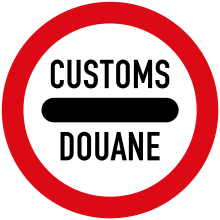
Back Zoll (Behörde) ALS جمرك Arabic Aduana AST Gömrük Azerbaijani Мытня Byelorussian Мытня BE-X-OLD Митница Bulgarian রপ্তানি শুল্ক Bengali/Bangla Duana Catalan گومرگ CKB
This article needs additional citations for verification. (June 2013) |
| Part of a series on |
| Taxation |
|---|
 |
| An aspect of fiscal policy |


Customs is an authority or agency in a country responsible for collecting tariffs and for controlling the flow of goods, including animals, transports, personal effects, and hazardous items, into and out of a country.[1][2] Traditionally, customs has been considered as the fiscal subject that charges customs duties (i.e. tariffs) and other taxes on import and export. In recent decades, the views on the functions of customs have considerably expanded and now covers three basic issues: taxation, security, and trade facilitation.[3]
Each country has its own laws and regulations for the import and export of goods into and out of a country, enforced by their respective customs authorities; the import/export of some goods may be restricted or forbidden entirely.[4] A wide range of penalties are faced by those who break these laws.[5]
- ^ "customs". WordReference. Retrieved 2013-09-16.
- ^ "International Convention on The Simplification and Harmonization of Customs Procedures".
- ^ Kormych, Borys (2018). "The modern trends of the foreign trade policy implementation: Implications for customs regulations". Lex Portus. 5 (5): 27–45. doi:10.26886/2524-101X.5.2018.2.
- ^ Cite error: The named reference
Chowdhury 1992was invoked but never defined (see the help page). - ^ "Transport Securities Administration – Budget Overview" (PDF). Retrieved 2019-03-11.